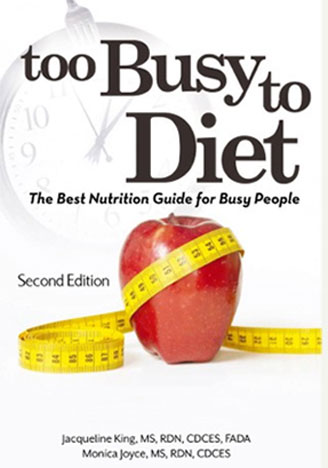How to Become a Registered Dietitian
in The Too Busy to Diet Blog on December 16, 2013

Written by Jennifer Martin, Dietetic Student at University of Illinois at Chicago
No matter your age post-college, it’s usually possible to become a registered dietitian. You just have to be willing to do the work. Dietitians need to put in at least 4 years of intensive education to be able to practice, which explains why R.D’s are the leading experts in nutrition. To become an R.D., you need all of the following:
- At least a bachelor’s degree
- Completion of an accredited supervised practice program
- To pass the national exam
- Continuing professional education requirements
Bachelor’s Degree
If you’re an undergraduate student right now or are starting next year, you can get your bachelor’s degree in nutrition. If you’re like me and got your bachelor’s degree in something completely different, it’s not too late. You have the option of getting a second bachelor’s degree, or you can go for your master’s degree in nutrition. Programs such as the University of Illinois at Chicago allow you to take all of your nutrition credits alongside undergrad students while also working on your master’s degree. Depending on what classes you took for your bachelor’s degree and how long ago you took them, you may have to take prerequisites. I didn’t take any science classes for my undergrad degree, so I had to take a year of biology and chemistry classes before starting the program. Your nutrition program of interest can evaluate your college transcripts for you and tell you which classes you’re missing.
Please note that all R.D.’s will eventually be required to get their master’s degree to practice. R.D’s with bachelor’s degrees will be grandfathered in, but you may want to consider a master’s program due to the added benefits (increased salary, etc).
For information on nutrition programs around the country, go here.
Supervised Practice Program
Once you complete your coursework, you’ll go on to do your internship. You must complete 1200 hours. You’ll work alongside dietitians in a variety of rotations that include food service, community nutrition, clinical nutrition, diabetes, professional work, and more. This is where you apply your knowledge and get a better idea of where you want to work once you complete all of your requirements.
If your degree is from a coordinated nutrition program, your internship is included in your program. These means that you don’t have apply separately for a dietetic internship. Since there’s currently a shortage of internships, the coordinated programs are competitive. If you’re not in a coordinated program, your school will help place you in an internship. If you don’t place, you can work as a dietetic technician until you find an internship.
National Examination
Once you finish your required classes and 1200 hours of supervised coursework, you can sit for the R.D. exam. If you pass, you’re a registered dietitian! Now, you can work.
Continuing Professional Education Requirements
You need continuing education requirements to keep your registration as a registered dietitian. There are tons of different ways that you can fulfill them, and you have plenty of time to do it!
For more information, go to eatright.org or ask us a question in the comment below.
Buy the Too Busy to Diet book
Get your copy of the definitive diet reference guide and healthy eating book today. Stop reading those misleading fad diet books and read an easy to follow book on how to lose weight and keep it off from actual Registered Dietitians.

Recent Posts
- Barbeque Turkey Meatloaf
- Pescado a la Veracruzana
- Juicy Pork Chops
- Rotasserie Chicken Casserole
- Grilled Salmon & Blueberry Salad